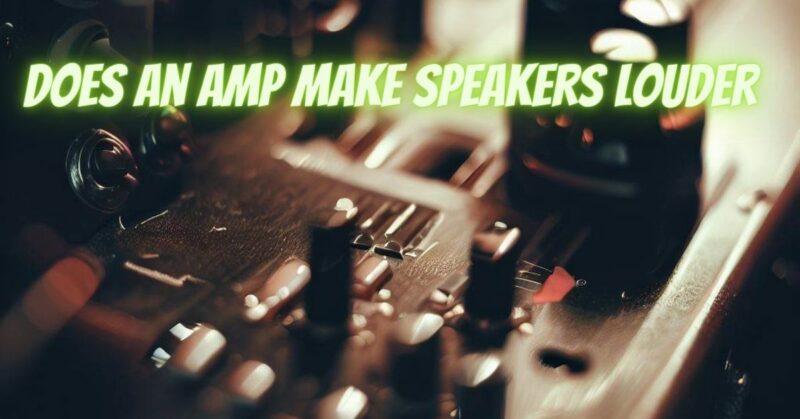The relationship between an amplifier and speakers is essential for achieving optimal sound performance in an audio system. While an amplifier plays a critical role in powering the speakers, it’s important to understand that its primary function is to provide sufficient electrical current to drive the speakers rather than directly making them louder. In this article, we will explore how an amplifier and speakers work together and clarify the concept of loudness in relation to the amplifier-speaker relationship.
- Amplifier Power and Speaker Sensitivity: The power output of an amplifier is measured in watts and represents the amount of electrical power it can deliver to the speakers. However, it is crucial to consider the sensitivity rating of the speakers. Speaker sensitivity refers to how efficiently the speakers convert electrical power into sound output. Speakers with higher sensitivity ratings require less power to produce a given volume level compared to speakers with lower sensitivity ratings. Therefore, the combination of a powerful amplifier and highly sensitive speakers can result in higher sound output levels.
- Matching Amplifier and Speaker Power: It is important to match the power output of the amplifier to the power handling capabilities of the speakers. Using an amplifier with too little power can lead to distortion and potentially damage the speakers if pushed beyond their limits. Conversely, using an amplifier with significantly more power than the speakers can result in unnecessary headroom and potential inefficiency, although it does not directly make the speakers louder.
- Clarity and Control: While an amplifier’s power does not directly make speakers louder, it does impact the clarity, control, and overall sound quality. Adequate power from the amplifier ensures that the speakers can accurately reproduce audio signals, especially during dynamic passages or at higher volume levels. Insufficient power may cause the sound to distort or clip, resulting in a loss of fidelity and potentially damaging the speakers.
- Speaker Placement and Room Acoustics: Speaker loudness is also influenced by factors such as speaker placement and room acoustics. Properly positioning the speakers and optimizing the acoustic characteristics of the listening environment can have a significant impact on perceived loudness. Reflections, room size, and other environmental factors can affect the overall sound dispersion and volume perception, regardless of the amplifier’s power.
- Volume Control: The volume control on the amplifier or the source device (such as a preamp or audio player) directly adjusts the level of sound output. The amplifier amplifies the signal sent from the source device according to the volume control setting. Increasing the volume control will result in a louder sound from the speakers, but this is due to the adjustment of the amplification level rather than the amplifier itself making the speakers inherently louder.
Conclusion:
An amplifier does not inherently make speakers louder. Instead, the amplifier’s role is to provide sufficient electrical current to power the speakers, allowing them to reproduce sound accurately. The combination of a properly matched amplifier and highly sensitive speakers can result in higher sound output levels. However, perceived loudness is also influenced by factors such as speaker sensitivity, speaker placement, room acoustics, and volume control settings. To achieve optimal sound performance, it is crucial to select an amplifier with an appropriate power output for the speakers, ensuring a balance between power, efficiency, and overall sound quality.


